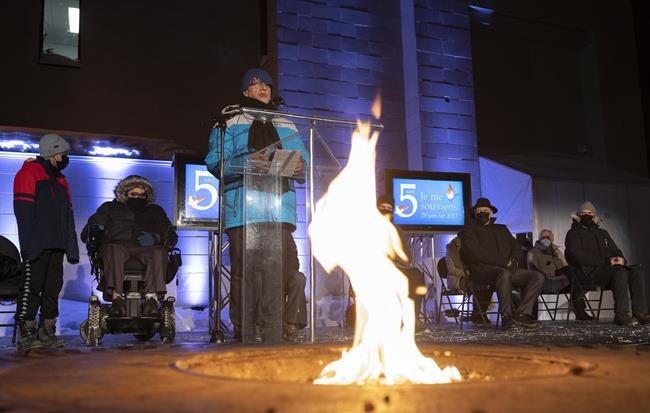QUEBEC — At times, Hakim Chambaz paused as he spoke at a memorial marking the fifth anniversary of the Quebec City Mosque attack, overcome with emotion.
Chambaz, one of the survivors of the attack that left six men dead and five others severely injured, spoke with a shaking voice about how the experience will always be with him.
"There was a choice between being silent and trying to forget and between confronting this tragedy and taking lessons from this horrible part of our lives," said Chambaz, who helped start a group that supports victims of other terrorist attacks.
"We hope for a better future for our children, above all for the families of the victims, and we pray to Allah to welcome them in their paradise," he said.
The ceremony at the Quebec City Islamic Cultural Centre was one of several that took place across Canada to honour the sombre anniversary, as well as the first National Day of Remembrance of the Quebec City Mosque Attack and Action Against Islamophobia, which was proclaimed last April.
Aymen Derbali, who was paralyzed in the attack, said the ceremony was part of "our duty to remember our brothers who fell that night under the bullets of hate."
His voice shook as he called on people to work together to ensure that similar events never happen again.
The Quebec City event, outside the mosque in Ste-Foy, a suburban borough of the provincial capital, was largely virtual due to the COVID-19 pandemic, with the general public encouraged to watch the commemoration online.
Premier François Legault; Quebec City Mayor Bruno Marchand; federal Health Minister Jean-Yves Duclos, who represents Quebec City in Parliament; and Ghislain Picard, the Chief of the Assembly of First Nations Quebec-Labrador also spoke at the event.
Marchand described the men who died as Quebecers who were known for their contribution to the community.
"Fathers, who are no longer here to look after their children, participate in the important events of their lives, to take the hand of their wives, share the pride of a great achievement with their colleagues, men who are no longer here to reach out to a friend in need," he said. "These were six of our own."
Among those who spoke at the commemoration was Nusaiba Al-Azem, the vice-chair of the London Muslim Mosque in London, Ont. On June 6, 2021, four members of a Muslim family were killed in that city while taking a walk. Police have said they believe the family members were targeted because of their faith, and the man accused in the case is now facing murder and terrorism charges.
Al-Azem said the commemorations are not for members of the Muslim community, because the Islamophobia is a daily reminder of the deadly attacks.
"We flinch when trucks speed by, we steel ourselves before walking into our places of worship, we feel unsafe in our own backyards, we brush off ignorant comment, after ignorant comment, after ignorant comment," she said. "We are overlooked for work opportunities and promotions, and, in some places, we're unable to earn a living while wearing a hijab, because the state allows it to be that way. We need no reminder, we are commemorating every day."
A commemorative ceremony took place at the London mosque earlier on Saturday.
In Ottawa, organizers of an interfaith, in-person vigil intended to commemorate the attack said they decided to move it online over fears that the event might be targeted by members of a convoy that is in the city to protest COVID-19 regulations.
Fareed Khan, who organized the event with his group Canadians United Against Hate, said while the protestors are describing themselves as being in favour of "freedom," they're depriving others of their liberties.
"They're talking about the freedom to be able to be irresponsible individuals and not be vaccinated and possibly spread COVID-19 around Canada," he said in an interview. "Meanwhile, our freedom has been deprived, our freedom to gather peacefully to remember victims of a brutal crime on a very sacred day. It is frustrating and it's angering."
Khan said that while his group did not receive any direct threats, the decision to move the vigil -- which had been scheduled to take place in downtown Ottawa -- was made after consulting with police and city officials.
He said he'd like to see real action from Canada's political leaders to fight Islamophobia and other forms of hate.
"We can't let voices of hate target minority communities, whether it's Muslims, or Jews, or Blacks, or Indigenous people, Asians, LGBTQ, we've got to make sure we stand up to those voices," Khan said. "We've got to actually at times go into the streets and be visible and say, 'no, we will not stand for this in our country.'"
This report by The Canadian Press was first published Jan. 29, 2022.
———
This story was produced with the financial assistance of the Facebook and Canadian Press News Fellowship.
Jacob Serebrin, The Canadian Press

